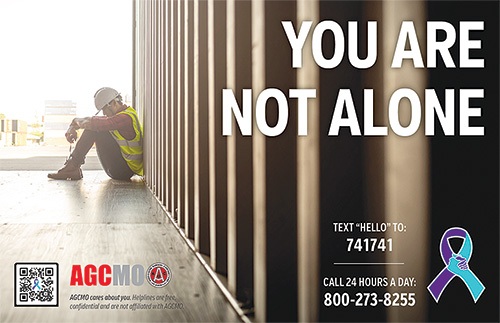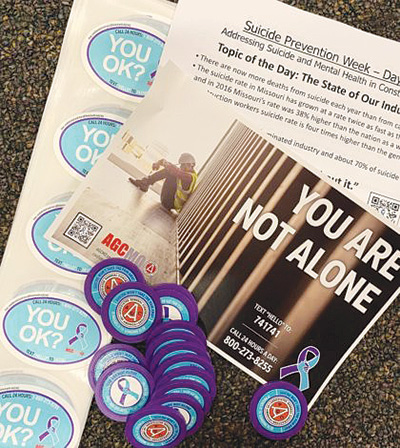AGC working to increase awareness, prevention during Suicide Prevention Week, Sept. 8-14
By TIM ROWDEN
Editor
 Construction can be a dangerous profession. There are a number of potential hazards on the jobsite, but one is rarely talked about – suicide.
Construction can be a dangerous profession. There are a number of potential hazards on the jobsite, but one is rarely talked about – suicide.
Suicide is a serious problem in the construction industry. Construction has the second highest rate of suicides among all occupations. It is a high stress job that has high rates of alcohol and drug use, as well as a “tough guy” culture.
A July 2016 study by the Centers for Disease Control and found that of about 12,300 suicides in the 17 states studied, 1,324 people (10.8 percent) worked in construction and extraction, and 1,049 (8.5 percent) worked in construction management.
The competitive, high-pressure environment of construction work, a higher prevalence of alcohol and substance abuse, furloughs, end-of-season layoffs, and separation from family are just some of the factors that can impact workers’ mental health.
Despite dramatic advances in awareness, prevention, intervention, and treatment, all too often people suffering from mental health conditions – which can lead to suicidal despair – suffer in silence.

That’s particularly true in the construction industry, where the tough guy culture of the union hall and jobsite may prevent some people from seeking the help they need.
The Associated General Contractors of Missouri (AGCMO) wants to help end the strong, silent culture where workers don’t feel they can ask for help.
Last week, on Aug. 26, more than 70 safety directors, superintendents, public health experts and other leaders gathered at the AGC’s Construction Training School on Knox Industrial Dr. to learn about some tools and Toolbox Talks that have been developed to address the issue ahead of Suicide Prevention Awareness Week (Sept. 8-14).
‘YOU ARE NOT ALONE’
Bo Cooper, safety director at Alberici, and Matt Cowell, vice president of safety of AGCMO, assembled a group of experts to develop tools for last week’s program to provide resources and promote action among AGCMO’s members to address mental health, addiction, and suicide stigmas.
One of the tools they’ve developed is a poker chip, similar to the ones AGCMO hands to workers reminding them to “work safe.” The new chips have an AGCMO logo on one side. On the other side they have a logo designed for the program, with the words “You Are Not Alone,” and contact information for the National Suicide Prevention Lifeline.
“Ultimately, the goal is to put this in everybody’s hand that we can,” Cooper said.
The AGCMO has also produced posters, hard hat stickers that ask the question “You OK?” and mini-poster stickers with contact information that can be placed in Johnny on the Spots and elsewhere on the job site.
“The chips are something we want to encourage people to give out,” said Steve Miller, central division safety director for McCarthy Building Companies. “It might be on a project. I’ve got a chip in my pocket so if I see somebody who may be showing the signs or depression or suicide, maybe I pull them to the side and give it to them, or set it on their chair where they always sit at break every day. It could be sitting at a bar at night and somebody has some issues. It’s just a takeaway that individuals can have.
“We want to give individuals that might need to utilize this service the ability to do it without others knowing. Somebody can get this help that’s available out there without having to go ask somebody for that help. Because that’s where the hang-up is. Nobody wants to talk to anybody about it, especially somebody that they know.”
TOOLBOX TOPICS
The AGCMO has developed a series of five Toolbox Talks addressing suicide in the construction industry, and is asking contractors and industry groups to use the hashtag #youarenotalone when posting to social media about suicide prevention.
The five Toolbox Talk topics are:
- The State of Our Industry – Presenting facts on the size of the suicide problem in construction.
- Reduce the Stigma – Focusing on the problems which the “tough guy” image creates.
- Recognizing the Warning Signs – Focusing on what to watch for in terms of behavior, organized into a chart.
- Starting the Conversation – How to listen and what questions to ask when a colleague is in crisis.
- Recap – A summary of takeaways from the week’s talks.
‘TOUGH GUY’ STEREOTYPE
Ann Marie Dale, PhD, associate professor in medicine and occupational therapy at Washington University School of Medicine, has been studying the health of construction workers for two decades — using data from unions and St. Louis area contractors.
She said that she has seen some improvement in the younger workers in the industry regarding mental health issues, many older workers still subscribe to the “tough guy” stereotype, making it difficult for younger workers to seek help when they are in crisis.
“It’s not just people who have been diagnosed with some mental disorder,” Dale said. “These are people who have financial problems, who have relationship problems, who are struggling to pay their bills.
“This is about how we start to address this problem in this tough guy culture where everybody needs to be super strong and not let anything show. This is an everybody problem.”
RECOGNIZE THE SIGNS
Dale says, warning signs that someone may be having an issue can include:
- Reckless behavior.
- Not paying attention to safety regulations.
- Being needlessly reckless on the job site.
“That can be a sign,” she said.
Dr. John Gaal, who recently retired as director of training and workforce for the Carpenters, spoke to those attending the program about his own family’s experience with suicide.
Gaal has founded the 21-14 Concussion Awareness Foundation in honor of his son John Gaal Jr., who took his life on March 24, 2017. The foundation is named after the football and soccer jersey numbers (21 and 14) of his son, who sustained several high school sports-related concussions that led to a posthumous diagnosis of Chronic Traumatic Encephalopathy (CTE).
Gaal is dedicating his retirement to education and research related to head trauma, as well as mental health, opioid addiction and suicide related issues.
“This is very near and dear to me,” Gaal said of his involvement in AGCMO’s suicide prevention efforts.
“Because of the stigma, it’s very difficult to get people to listen,” he said. “I think a lot of times it’s just the fact that they don’t want to talk about it, it’s a very tough topic. It’s a crisis that we have not only in this industry but in our nation in regard to mental health and the suicide.”
Cowell says there are plans to take the program statewide, reaching beyond the AGCMO and its members. He is asking companies that want to help the program to channel their donations through Dr. Gaal’s 21-14 Foundation, which is a 501(c)(3) nonprofit.
Dr. Gaal can be reached by email jsgaal59@gmail.com or by phone at 314-805-9966.
FOR MORE INFORMATION
For more information, or to download the Toolbox Talks or posters, visit agcmo.org/WCM/Nav_Items/Member_Resources/Safety/Suicide_Prevention_in_Construction_Industry, or contact Matt Cowell at AGC at 314-781-2356, or by email at mcowell@agcmo.org.

